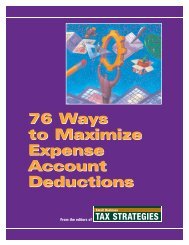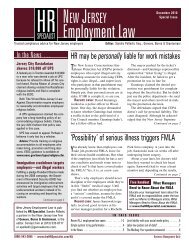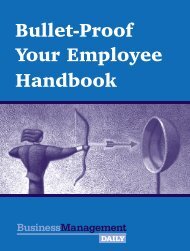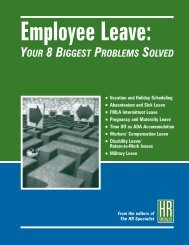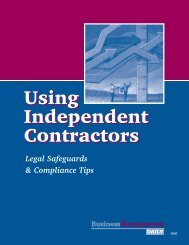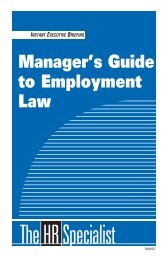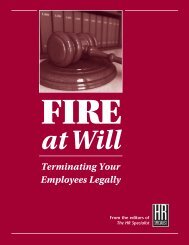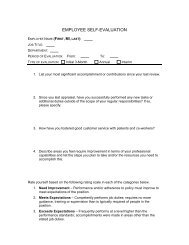- Page 3 and 4: Employer’sPracticalLegal GuidePla
- Page 5 and 6: ContentsIntroductionSpecial Report
- Page 7 and 8: contents iiiMinimum-Wage Compliance
- Page 9 and 10: contents v8. Alcohol/Drug Testing 8
- Page 11: contents viiMilitary Family Leave U
- Page 14 and 15: xEmployer’s Practical Legal Guide
- Page 16 and 17: xiiEmployer’s Practical Legal Gui
- Page 18 and 19: xivEmployer’s Practical Legal Gui
- Page 20 and 21: 1.2 Employer’s Practical Legal Gu
- Page 22 and 23: 1.4 Employer’s Practical Legal Gu
- Page 24 and 25: 1.6 Employer’s Practical Legal Gu
- Page 26 and 27: 1.8 Employer’s Practical Legal Gu
- Page 28 and 29: 1.10 Employer’s Practical Legal G
- Page 30 and 31: 1.12 Employer’s Practical Legal G
- Page 32 and 33: 1.14 Employer’s Practical Legal G
- Page 34 and 35: 1.16 Employer’s Practical Legal G
- Page 36 and 37: 1.18 Employer’s Practical Legal G
- Page 40 and 41: 1.22 Employer’s Practical Legal G
- Page 42 and 43: 1.24 Employer’s Practical Legal G
- Page 44 and 45: 1.26 Employer’s Practical Legal G
- Page 46 and 47: 1.28 Employer’s Practical Legal G
- Page 48 and 49: 1.30 Employer’s Practical Legal G
- Page 50 and 51: 1.32 Employer’s Practical Legal G
- Page 52 and 53: 1.34 Employer’s Practical Legal G
- Page 54 and 55: 1.36 Employer’s Practical Legal G
- Page 57 and 58: Section 2Employee Conduct/Performan
- Page 59 and 60: Employee Conduct/Performance 2.3Bew
- Page 61 and 62: Employee Conduct/Performance 2.5Don
- Page 63 and 64: Employee Conduct/Performance 2.7and
- Page 65 and 66: Employee Conduct/Performance 2.9➤
- Page 67 and 68: Employee Conduct/Performance 2.11Un
- Page 69 and 70: Employee Conduct/Performance 2.13Be
- Page 71 and 72: Employee Conduct/Performance 2.15
- Page 73 and 74: Employee Conduct/Performance 2.17Pe
- Page 75 and 76: Employee Conduct/Performance 2.19Ca
- Page 77 and 78: Employee Conduct/Performance 2.21or
- Page 79 and 80: Employee Conduct/Performance 2.23Tr
- Page 81: Employee Conduct/Performance 2.25pe
- Page 84 and 85: 3.2 Employer’s Practical Legal Gu
- Page 86 and 87: 3.4 Employer’s Practical Legal Gu
- Page 88 and 89:
3.6 Employer’s Practical Legal Gu
- Page 90 and 91:
3.8 Employer’s Practical Legal Gu
- Page 92 and 93:
3.10 Employer’s Practical Legal G
- Page 94 and 95:
3.12 Employer’s Practical Legal G
- Page 96 and 97:
3.14 Employer’s Practical Legal G
- Page 98 and 99:
3.16 Employer’s Practical Legal G
- Page 101 and 102:
Fair LaborStandards ActSection 4The
- Page 103 and 104:
Fair Labor Standards Act 4.3Before
- Page 105 and 106:
Fair Labor Standards Act 4.5Other W
- Page 107 and 108:
Fair Labor Standards Act 4.7In addi
- Page 109 and 110:
Fair Labor Standards Act 4.9Caution
- Page 111 and 112:
Fair Labor Standards Act 4.11hours
- Page 113 and 114:
Fair Labor Standards Act 4.13(or hi
- Page 115 and 116:
Fair Labor Standards Act 4.15Employ
- Page 117 and 118:
Fair Labor Standards Act 4.17a rule
- Page 119 and 120:
Fair Labor Standards Act 4.19than $
- Page 121 and 122:
Fair Labor Standards Act 4.21exempt
- Page 123 and 124:
Fair Labor Standards Act 4.23The ty
- Page 125 and 126:
Fair Labor Standards Act 4.25• De
- Page 127 and 128:
Fair Labor Standards Act 4.27Exampl
- Page 129 and 130:
Fair Labor Standards Act 4.29‘Fee
- Page 131 and 132:
Fair Labor Standards Act 4.31■ Ad
- Page 133 and 134:
Fair Labor Standards Act 4.33■ Co
- Page 135 and 136:
Section 5IndependentContractorsMany
- Page 137 and 138:
independent Contractors 5.3• The
- Page 139 and 140:
independent Contractors 5.5Audit Bl
- Page 141 and 142:
independent Contractors 5.7you with
- Page 143 and 144:
independent Contractors 5.9Form 109
- Page 145 and 146:
independent Contractors 5.11certain
- Page 147 and 148:
independent Contractors 5.13drivers
- Page 149 and 150:
independent Contractors 5.15Contrac
- Page 151 and 152:
Section 6Workers’ Safety/HealthEm
- Page 153 and 154:
Workers’ Safety/Health 6.3In addi
- Page 155 and 156:
Workers’ Safety/Health 6.5Althoug
- Page 157 and 158:
Workers’ Safety/Health 6.7Home-of
- Page 159 and 160:
Workers’ Safety/Health 6.9Whistle
- Page 161 and 162:
Workers’ Safety/Health 6.11AIDS P
- Page 163 and 164:
Workers’ Safety/Health 6.13Most s
- Page 165 and 166:
Workers’ Safety/Health 6.15and re
- Page 167:
Workers’ Safety/Health 6.17The Wo
- Page 170 and 171:
7.2 Employer’s Practical Legal Gu
- Page 172 and 173:
7.4 Employer’s Practical Legal Gu
- Page 174 and 175:
7.6 Employer’s Practical Legal Gu
- Page 176 and 177:
7.8 Employer’s Practical Legal Gu
- Page 178 and 179:
7.10 Employer’s Practical Legal G
- Page 180 and 181:
7.12 Employer’s Practical Legal G
- Page 182 and 183:
7.14 Employer’s Practical Legal G
- Page 184 and 185:
7.16 Employer’s Practical Legal G
- Page 186 and 187:
7.18 Employer’s Practical Legal G
- Page 188 and 189:
7.20 Employer’s Practical Legal G
- Page 190 and 191:
7.22 Employer’s Practical Legal G
- Page 192 and 193:
7.24 Employer’s Practical Legal G
- Page 194 and 195:
7.26 Employer’s Practical Legal G
- Page 196 and 197:
7.28 Employer’s Practical Legal G
- Page 198 and 199:
7.30 Employer’s Practical Legal G
- Page 200 and 201:
7.32 Employer’s Practical Legal G
- Page 202 and 203:
7.34 Employer’s Practical Legal G
- Page 204 and 205:
8.2 Employer’s Practical Legal Gu
- Page 206 and 207:
8.4 Employer’s Practical Legal Gu
- Page 208 and 209:
8.6 Employer’s Practical Legal Gu
- Page 211 and 212:
Gender/AgeDiscriminationSection 9Th
- Page 213 and 214:
gender/Age Discrimination 9.3allege
- Page 215 and 216:
gender/Age Discrimination 9.5Gender
- Page 217 and 218:
gender/Age Discrimination 9.7they
- Page 219 and 220:
gender/Age Discrimination 9.9her co
- Page 221 and 222:
gender/Age Discrimination 9.11Cathe
- Page 223 and 224:
gender/Age Discrimination 9.13In Le
- Page 225 and 226:
gender/Age Discrimination 9.15Secon
- Page 227 and 228:
gender/Age Discrimination 9.17➤ O
- Page 229 and 230:
gender/Age Discrimination 9.19said
- Page 231 and 232:
Section 10Civil Rights ActThe Unite
- Page 233 and 234:
civil Rights Act 10.3Hostile Enviro
- Page 235 and 236:
civil Rights Act 10.5a historically
- Page 237 and 238:
civil Rights Act 10.7What’s the b
- Page 239 and 240:
civil Rights Act 10.9➤ Recommenda
- Page 241 and 242:
Section 11Sexual HarassmentIt’s b
- Page 243 and 244:
sexual Harassment 11.3■ During th
- Page 245 and 246:
sexual Harassment 11.5of the allege
- Page 247 and 248:
sexual Harassment 11.7female. Haras
- Page 249 and 250:
sexual Harassment 11.9since HR was
- Page 251 and 252:
sexual Harassment 11.11Sexual Orien
- Page 253 and 254:
Americans withDisabilities ActSecti
- Page 255 and 256:
americans with Disabilities Act 12.
- Page 257 and 258:
americans with Disabilities Act 12.
- Page 259 and 260:
americans with Disabilities Act 12.
- Page 261 and 262:
americans with Disabilities Act 12.
- Page 263 and 264:
americans with Disabilities Act 12.
- Page 265 and 266:
americans with Disabilities Act 12.
- Page 267 and 268:
americans with Disabilities Act 12.
- Page 269 and 270:
americans with Disabilities Act 12.
- Page 271 and 272:
americans with Disabilities Act 12.
- Page 273 and 274:
americans with Disabilities Act 12.
- Page 275 and 276:
americans with Disabilities Act 12.
- Page 277 and 278:
americans with Disabilities Act 12.
- Page 279 and 280:
FMLA Leave,Military LeaveEmployees
- Page 281 and 282:
FMLA Leave, Military Leave 13.3Summ
- Page 283 and 284:
FMLA Leave, Military Leave 13.5appr
- Page 285 and 286:
FMLA Leave, Military Leave 13.7FMLA
- Page 287 and 288:
FMLA Leave, Military Leave 13.9You
- Page 289 and 290:
FMLA Leave, Military Leave 13.11Not
- Page 291 and 292:
FMLA Leave, Military Leave 13.13Key
- Page 293 and 294:
FMLA Leave, Military Leave 13.15Not
- Page 295 and 296:
FMLA Leave, Military Leave 13.17If
- Page 297 and 298:
FMLA Leave, Military Leave 13.19poo
- Page 299 and 300:
FMLA Leave, Military Leave 13.21Emp
- Page 301 and 302:
FMLA Leave, Military Leave 13.23Not
- Page 303 and 304:
FMLA Leave, Military Leave 13.25his
- Page 305 and 306:
Section 14Your Rights in aUnion Sit
- Page 307 and 308:
your Rights in a Union Situation 14
- Page 309 and 310:
your Rights in a Union Situation 14
- Page 311 and 312:
your Rights in a Union Situation 14
- Page 313 and 314:
your Rights in a Union Situation 14
- Page 315 and 316:
your Rights in a Union Situation 14
- Page 317 and 318:
Section 15ERISAThe Employee Retirem
- Page 319 and 320:
ERISA 15.3• Foreign plans.• Sel
- Page 321 and 322:
ERISA 15.5breach of fiduciary duty
- Page 323 and 324:
ERISA 15.7Automatic Contribution Ar
- Page 325 and 326:
ERISA 15.9Generally, participants c
- Page 327 and 328:
ERISA 15.11Pension Protection ActIn
- Page 329 and 330:
ERISA 15.13• Name and address of
- Page 331:
ERISA 15.15is deemed denied and the
- Page 334 and 335:
A.2 Employer’s Practical Legal Gu
- Page 336 and 337:
A.4 Employer’s Practical Legal Gu
- Page 338 and 339:
A.6 Employer’s Practical Legal Gu
- Page 340:
B.2 Employer’s Practical Legal Gu




